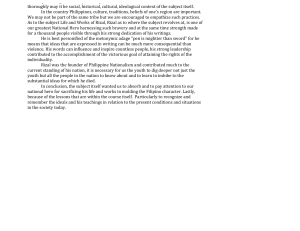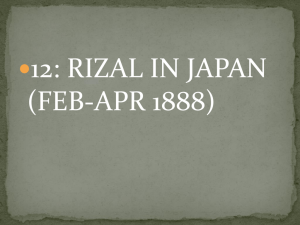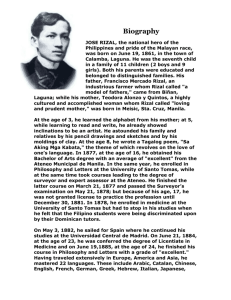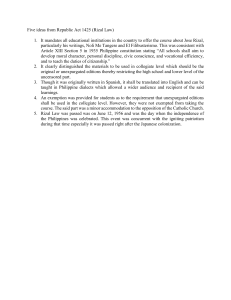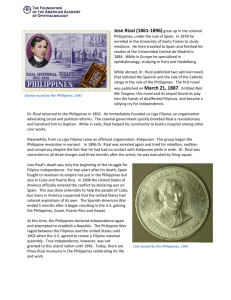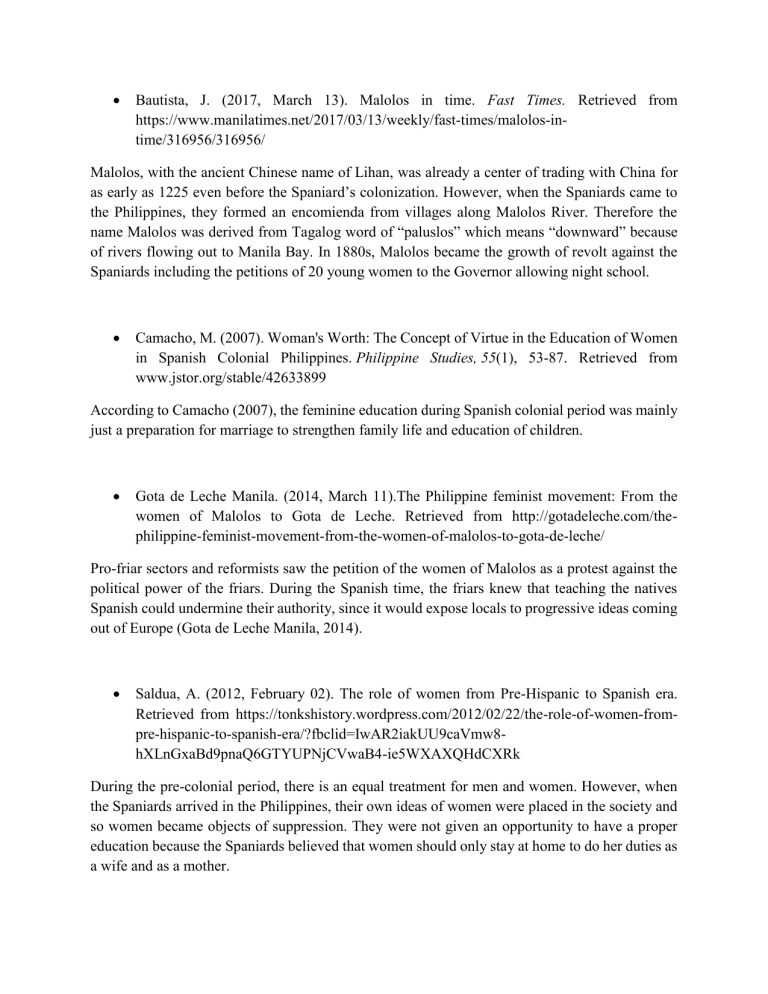
Bautista, J. (2017, March 13). Malolos in time. Fast Times. Retrieved from https://www.manilatimes.net/2017/03/13/weekly/fast-times/malolos-intime/316956/316956/ Malolos, with the ancient Chinese name of Lihan, was already a center of trading with China for as early as 1225 even before the Spaniard’s colonization. However, when the Spaniards came to the Philippines, they formed an encomienda from villages along Malolos River. Therefore the name Malolos was derived from Tagalog word of “paluslos” which means “downward” because of rivers flowing out to Manila Bay. In 1880s, Malolos became the growth of revolt against the Spaniards including the petitions of 20 young women to the Governor allowing night school. Camacho, M. (2007). Woman's Worth: The Concept of Virtue in the Education of Women in Spanish Colonial Philippines. Philippine Studies, 55(1), 53-87. Retrieved from www.jstor.org/stable/42633899 According to Camacho (2007), the feminine education during Spanish colonial period was mainly just a preparation for marriage to strengthen family life and education of children. Gota de Leche Manila. (2014, March 11).The Philippine feminist movement: From the women of Malolos to Gota de Leche. Retrieved from http://gotadeleche.com/thephilippine-feminist-movement-from-the-women-of-malolos-to-gota-de-leche/ Pro-friar sectors and reformists saw the petition of the women of Malolos as a protest against the political power of the friars. During the Spanish time, the friars knew that teaching the natives Spanish could undermine their authority, since it would expose locals to progressive ideas coming out of Europe (Gota de Leche Manila, 2014). Saldua, A. (2012, February 02). The role of women from Pre-Hispanic to Spanish era. Retrieved from https://tonkshistory.wordpress.com/2012/02/22/the-role-of-women-frompre-hispanic-to-spanish-era/?fbclid=IwAR2iakUU9caVmw8hXLnGxaBd9pnaQ6GTYUPNjCVwaB4-ie5WXAXQHdCXRk During the pre-colonial period, there is an equal treatment for men and women. However, when the Spaniards arrived in the Philippines, their own ideas of women were placed in the society and so women became objects of suppression. They were not given an opportunity to have a proper education because the Spaniards believed that women should only stay at home to do her duties as a wife and as a mother. Through Rizal's letter entitled "To the Young Women of Malolos", he expresses his thoughts that would motivate them to make a change and become involved in the society to become empowered. The letter contained evidences of women empowerment such as: The Philippines had a simple type of education during the Pre-spanish era and only standard alphabet and baybayin or alibata are being taught in the Philippines before the Spaniards came. The role of women during the Pre-spanish era was higher than the roles they had during the Spanish colonial period. They were given a chance of becoming a priestess, healers, and they even had an opportunity of handling leadership roles and they can even fight as warriors. Women were treated as equal as men during the pre-spanish era where women can inherit property and can also be a part of a huge business and trading. Ruiz, M. C. M. C., Baco, M. C. N., Ornopia, M. A. O., Abas, J. L. M. R., Albeos, J. C., Fernandez, R. B., & Pajares, G. G. Women Empowerment in the Selected Letters of Dr. Jose P. Rizal. “The Filipino woman no longer bows her head and bends her knees; her hope in the future is revived; gone is the mother who helps to keep her daughter in the dark, who educates her in selfcontempt and moral annihilation." (Jose Rizal Political and Historical Writings, 2011). Based from the letter, Rizal pointed out that a Filipino woman is not inferior and does not allow anyone to devalue their existence. He expressed in his letter on how fortifying a Filipino woman's hope can be in the future. Another important detail in the letter founded in the sixth paragraph “Important indeed are the duties that women must fulfill in order to relieve the country of her sufferings, but they are not beyond the strength and char- acter of the Filipino women to perform (Gonzales, 1997). Everybody knows the power and the prudence of the women in the Philippines. Hence they bind them, chain them, weaken their spirit, so sure are they that so long as the mother are a slave, all her children can also be enslaved. This is the reason for the enslavement of Asia; the women of Asia are ignorant and oppressed. Europe and America are powerful because their women are free and educated, their mind is lucid, and their character is strong. The Filipino women possess more virtue than those of other countries (2011)" explains that a woman is significant to the society because their responsibilities provide contribution to the development of the country. Moreover, Rizal stated that Filipino women possesses a better quality than that of European and American women (Jose Rizal Political and Historical Writings, 2011). Rizal also highlighted that in order for Filipino women to be freed from enslavement, they should gain education because it is one of the most important areas for women empowerment. It would also help in the prevention of women discrimination as education provides power for women and enables them to make rightful choices of their paths they have dreamt to lead. Dr. Jose P. Rizal is a supporter of women empowerment. He did not speak of beauty of women alone but rather he dictated the women's character and education. He emphasized that a Filipino wife should support her husband with courage. This would aid in creating better and respectful men in the society. His thought about the weakening spirit of women in the Philippines stresses that women possesses power which the Spaniards where afraid of. Barlongay, M. A. S. (2017, February 5). Bulacan in Philippine History. Retrieved from https://newsbits.mb.com.ph/2017/02/05/bulacan-in-philippinehistory/?fbclid=IwAR1AT72MIamGVOLoQfZneoFjZXzVt3odKY0dGg3KicvQ126y0R4ExrfH4g. Barlongay (2017) stated that the friars engaged the educational system of the Philippines during the Spanish colonial period. They regarded education as a threat to the church and demoted women strictly to housekeeping and child parenting which is why majority of the residents made their own private schools. On December 12, 1888, 20 women from Malolos signed a petition to Governor-general Valeriano Weyler to allow them to open a night school to learn the Spanish language under Teodoro Sandiko, who has a private school in Malolos. Majority of the young women of Malolos were related to each other. They were power of the four mestizo-sangley clans of Malolos such as Tiongsons, Tantocons, Reyeses and Santoses. Spanish priest, Father Felipe Garcia was against the petition and wanted the governer to turn it down. However, the young women did not give up and went to manila to convince the governor-general to sign their petition with the help of reformist Doroteo Cortes which later in turned out to be a success provided that Guadalupe Reyes would be their teacher and the class should be during the daytime. The young women's movement became the first one in three Philippine history where a group of women fought to have equal rights in education. Arias, J. (2018, June 19). How did Jose Rizal view women when he was still alive? Retrieved from https://preen.ph/77063/how-did-jose-rizal-view-women-when-he-wasstillalive?fbclid=IwAR2mmjon2mzW9M2_OQbiKTPlaliLhvXfAGVGmE_p6iSIsvDFDlac_ 2bCt8U. Rizal portrayed women as possessing a strong role model. Since Rizal grew up in a dominant household, His mother, Terrifies Alonso, was the one who taught him at a young age and open his mind to what is happening in the society such as bigotry and injustice. Her mother was also the one who taught him the value of education (Arias, 2018). As Rizal used the teachings of his mother throughout his life, this may have become one of the reasons why he saw women as having a significant role in the society. Arias (2018) stated that the Philippines one possesses an egalitarian society where women has equal opportunities and treatments to men right before the Spanish colonization. The oppression of women was a product Spanish colonization which engaged women with the thought that their only role was to stay in the household and reproduce children. Rizal's fictional character Maria Clara and Sisa represented of how destructive patriarchy and colonialism is to the roles of women. Titgemeyer, L.S. (1997, March 1). A description of the Filipino Woman during PreSpanish time. La Mujer Indigena – The Native Woman. Retrieved from https://www.univie.ac.at/Voelkerkunde/apsis/aufi/wstat/mujer.htm The status and situation of Filipino women was good during the Pre-Spanish colonial period until the Spaniards came that colonized the Philippines and made them slaves. Filipino women becoming as slaves became a culture or tradition in the Philippines which means that they have lesser rights and freedom than men. Jose Rizal was fighting for equality, freedom, and rights for the women not only in Malolos, but also in Philippines. Palafox, Q.A. (2012, September 4). Girl power: the women of Malolos. Retrieved from http://nhcp.gov.ph/girl-power-the-women-of-malolos/ The young women in Malolos that participated in a peaceful movement and fought for their rights made a huge impact in the Philippines in terms of educational, political, and social rights. One of the most important events that contributed in the feminist movement in the Philippine History is when the Women of Malolos handed a letter that has a request of allowing them to participate in a night school where they can learn Spanish language. Due to the reformation of education in 1863, the friars are the ones who are assigned in educating the people, and since they have the responsibility of educating the people, education became more of a religious education. When the Spaniards came, Filipinos were naturalized into a devoted and patriarchal system of education which pointed out that women were the property of men. The culture of the Spaniards which was brought into the Philippines is an evidence of feudalism (Palafox, 2015). The young women in Malolos that participated in a peaceful movement and fought for their rights made a huge impact in the Philippines in terms of educational, political, and social rights. One of the most important events that contributed in the feminist movement in the Philippine History is when the Women of Malolos handed a letter that has a request of allowing them to participate in a night school where they can learn Spanish language. Due to the reformation of education in 1863, the friars are the ones who are assigned in educating the people, and since they have the responsibility of educating the people, education became more of a religious education (Palafox, 2015). Fitzpatrick, K. (2013). Religion and Spanish colonialism in the Philippines. The Archaeological Studies Program Department of Sociology and Archaeology. Retrieved from https://minds.wisconsin.edu/bitstream/handle/1793/66613/Fitzpatrick_Thesis.pdf?sequen ce=1 The influence of the Spaniards during the Spanish colonial period is somehow still being practiced until now such as some of the beliefs back then. Filipinos who converted to Catholicism are drawn to Spanish Catholicism because the Spaniards saw some similarities and is related to the Filipinos regarding to religion. The Spaniards took advantage of introducing Spanish Catholicism to the Filipinos in order to help colonize the Philippines. The Spaniards used religion as a strategy to colonize the Philippines. Durano, M.B. (2011, December 11). Reason and responsibility: reading Rizal’s letter to his Maloleña compatriots using the capabilities approach. The Philippine Review of Economics, 48(2), 79-116. Retrieved from http://citeseerx.ist.psu.edu/viewdoc/download?doi=10.1.1.892.773&rep=rep1&type=pdf The letter of Rizal to the Women of Malolos focused on reason and supported education for women. Religiousness required reason and without reason it was only religiosity. Rizal said that women's value was subject to change depending on their contribution to the Filipino Identity, while also emphasizing that the nature of motherhood showed the nature of the motherland. When the letter of appeal for educational opportunities which were sent by the women of Malolos to the Spanish governor-general Valeriano Weyler was praised by Rizal for its success in 1888, the Maloleñas Agency and their process of empowerment was being celebrated by Rizal. In Rizal's letter “To my country women, the young women of Malolos” written in 1889, He had not thought of Bravery as a trait possessed by Filipino women until he had heard of this news. These women were allies by Rizal in his demand for the Filipino nation's improvement, this inspires hope and encouraging confidence in victory over suffering. Foundation for Media Alternatives. (2017, November 29). This day in #Herstory: The women of Malolos. Retrieved from https://www.fma.ph/2017/11/29/today-herstorywomen-malolos/ A group of 20 women from Malolos, Bulacan made a movement for educational reforms in the country. Eventually, they were allowed to manage their own school on the condition that they would fund their education, and classes held in daytime. Yet, the school run for only three months because of the pressure from the authorities (Foundation for Media Alternatives, 2017). Fernandez, A. P. (1990). Nature and Culture: Woman and Man. Kababaihan,. Kalinangan, Kaunlaran, Essays on Women and Culture. Retrieved from file:///C:/Users/admin/Documents/College/Rizal/3228-7428-1-PB.pdf Mothers passed down to their own daughters the teaching and training of being “others” to men, while passing their sons the teaching and training of being the “one”; hence daughters have been taught to be passive: dull and weak, while the sons being the active: intelligent and strong (Fernandez, 1990). Students in Woman's Rights in America. (2002). From Wollstonecraft to Mill: What British and European Ideas and Social Movements Influenced the Emergence of Feminism in the Atlantic World, 1792-1869. Retrieved from https://womhist.alexanderstreet.com/awrm/intro.htm. The development of feminism in Atlantic World during 1792 to 1869 arose from the interactions between countries, and across the Atlantic Ocean. Feminist ideas and movements developed in an international context that supported the migration of people and sharing ideas across the countries. Early feminist included men and women who supported equality for women in public organizations, and some feminist demanded on a woman’s right to have a control over her body. Most feminist during this period considered higher education as a woman’s right and is one of the their most important demand (students in Woman's Rights in America, 2002). Güney, A., & Yavuz, M. E. (2008). e-Journal of New World Sciences Academy. THE NINETEENTH CENTURY LITERATURE AND FEMINIST MOTIVES IN JANE AUSTEN’S NOVELS, 3. Retrieved from https://dergipark.org.tr/tr/download/articlefile/186844 Feminism, in general, is a philosophy in which women and their works are valued. Feminism is based on the equality for women in such areas like social, political and economic. Feminism can also be mean as a movement or a revolution which anyone who wish the world to be equal without boundaries can be part of it. These boundaries or hindrances can be known as discrimination and biases against gender, sexual orientation, age, marital status and economic status. Feminists view the world as being unequal to women. They wish to show the difference and the notion that men are superior than women. At the beginning of the 19th century, poor opportunity was given for women, hence most of them had a difficult time when attempting to explore and try different parts of society. The lack of educational opportunities for women and their distinction from almost all types of jobs gave them few choices in life (Güney & Yavuz, 2008).
